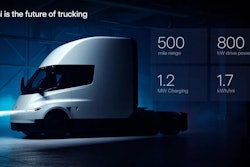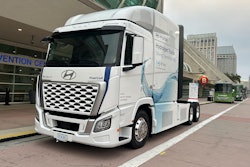Clean energy stakeholders are asking regulators in California, New York and Washington to require full truck price disclosures from manufacturers as a condition of receiving state-level incentive dollars.
In a letter to the California Air Resources Board (CARB), the groups called on the regulator to require price disclosure on the cost of trucks and for manufacturers to publish prices at least twice annually. The submission adds that truck prices “are negotiated behind closed doors, and vary widely between buyers”, giving “manufacturers extraordinary market power—allowing them to extract higher prices from public programs and private fleets alike, with little accountability."
California’s Clean Truck & Bus Vouchers program has allocated $1.7 billion to date.
A study conducted this year by the International Council on Clean Transportation (ICCT) showed the cost of electric Class 8 heavy trucks in the U.S. jumped by 27% ($87,100) between 2020 and 2025, while the cost of a similar truck in Europe fell by 23%.
The median price of a model year 2024 battery-electric heavy-duty tractor truck in the United States, according to ICCT, is $379,800—roughly 2.5 times the price of a combustion engine tractor. In China, the median price of the same class and type of vehicle is $119,600.
“Opaque pricing has become the norm, distorting competition, undermining public trust, and limiting the ability of small fleets and independent owner operators to participate in the clean vehicle transition,” the groups charged in their submission to CARB.
In a letter to New York Governor Kathy Hochul with recommendations for the state’s Interagency Working Group to Accelerate Clean Vehicle Adoption, a coalition of advocates including Earthjustice, Alliance for Clean Energy New York, and the Tri-State Transportation Campaign call for “pricing clarity and market fairness."
“To ensure public funds are efficiently deployed, New York should explore requiring full price disclosure as a condition of receiving state incentive funds,” the submission added.
Both Sierra Club and the Natural Resources Defense Council also submitted comments in response to a public dialogue period on Washington state’s ZEVergreen Initiative, calling on Washington Department of Ecology to adopt similar measures to promote price transparency in truck sales.
Complicated path to zero
Trucking's path to zero emissions is currently being litigated.
Just minutes after President Donald Trump signed in June a trio of resolutions that ended California Air Resources Board’s (CARB) electric vehicle mandates and strict diesel-emissions standards, the state doubled down on its commitment to clean cars and trucks.
Governor Gavin Newsom signed an executive order further advancing California’s clean vehicle transition and kickstarting development of next-generation policy to spur innovation, updating state vehicle purchasing requirements, and directing the state to develop new actions to accelerate affordable clean vehicle adoption.
U.S. District Judge Dena Coggins last week issued a preliminary injunction barring California from enforcing the terms of the Clean Truck Partnership CARB signed with truck and engine manufacturers. Daimler Truck North America (DTNA), PACCAR, International Motors, and Volvo Group North America (VGNA) sought an injunction in a lawsuit filed in August, arguing that when President Donald Trump in June walked back Biden-era Environmental Protection Agency waivers relating to California's Advanced Clean Trucks (ACT) regulations and its Omnibus Low NOx (Omnibus) rule, it also voided the CTP.
In September, CARB submitted comments opposing the U.S. Environmental Protection Agency’s (EPA) push to overturn the 2009 endangerment finding, noting that the EPA’s proposal ignores more than 15 years of its own research and regulations.
The EPA has for almost 20 years required medium- and heavy-duty diesel vehicles to use Diesel Exhaust Fluid (DEF) and aftertreatment systems to reduce nitrogen oxide (NOx) emissions. In July, the Trump administration targeted the endangerment finding for repeal, which has allowed presidential administrations to regulate six greenhouse gases (carbon dioxide, methane, nitrous oxide, hydrofluorocarbons, perfluorocarbons, and sulfur hexafluoride) since 2009.











